 The New Guys: The Historic Class of Astronauts That Broke Barriers and Changed the Face of Space Travel by Meredith Bagby
The New Guys: The Historic Class of Astronauts That Broke Barriers and Changed the Face of Space Travel by Meredith Bagby Format: eARC
Source: supplied by publisher via Edelweiss
Formats available: hardcover, ebook, audiobook
Genres: history, nonfiction, science, science history, U.S. history
Pages: 528
Published by William Morrow & Company on February 7, 2023
Purchasing Info: Author's Website, Publisher's Website, Amazon, Barnes & Noble, Kobo, Bookshop.org, Better World Books
Goodreads
The never-before-told story of NASA's 1978 astronaut class, which included the first American women, the first African Americans, the first Asian American, and the first gay person to fly to space. With the exclusive participation of the astronauts who were there, this is the thrilling, behind-the-scenes saga of a new generation that transformed space exploration
The story of NASA's Astronaut Class 8, or "The F*cking New Guys," as their military predecessors nicknamed them, is an unprecedented look at these extraordinary explorers who broke barriers and blasted through glass ceilings. Egos clashed, ambitions flared, and romances bloomed as the New Guys competed with one another and navigated the cutthroat internal politics at NASA for a chance to rocket to the stars.
Marking a departure from the iconic military test pilots who had dominated the space program since its inception, the New Guys arrived at the dawn of a new era of space flight. Teardrop-shaped space capsules from Mercury, Gemini, and Apollo gave way to the space shuttle, a revolutionary space plane capable of launching like a rocket, hauling cargo like a truck, and landing back on Earth like an airliner. They mastered this new machine from its dangerous first test flights to its greatest achievements: launching hundreds of satellites, building the International Space Station, and deploying the Hubble Space Telescope.
The New Guys depicts these charismatic young astronauts and the exuberant social and scientific progress of the space shuttle program against the efforts of NASA officials who struggled to meet America's military demands and commercial aspirations. When NASA was pressured to fly more often and at greater risk, lives were lost in the program's two biggest disasters: Challenger (1986) and Columbia (2003).
Caught in the crosshairs of this battle are the shuttle astronauts who gave their lives in those catastrophes, and who gave their lives' work pursuing a more equitable future in space for all humankind. Through it all they became friends, rivals, lovers, and ultimately, family.
My Review:
 Just as Tom Wolfe’s The Right Stuff set its portrait of the original astronaut class, the Mercury Seven, into its time and place in the history of the space program and the 1950s space race that preceded it, The New Guys performs a similar service for the 1978 astronaut class, the 35 astronauts recruited to help design, build and crew the Space Shuttle.
Just as Tom Wolfe’s The Right Stuff set its portrait of the original astronaut class, the Mercury Seven, into its time and place in the history of the space program and the 1950s space race that preceded it, The New Guys performs a similar service for the 1978 astronaut class, the 35 astronauts recruited to help design, build and crew the Space Shuttle.
The concepts behind the books may be similar, but the people they follow were very, very different, both by design and because of the events of the intervening decade, the tumultuous 1960s, when the civil rights movements took hold and gained more ground than anyone could have imagined in the 1950s.
At the same time, there’s something similar in the two groups, that both were willing to sit “on top of an enormous Roman candle…and wait for someone to light the fuse,” as Wolfe said about the group of astronauts he portrayed. That most of the fuel for that Roman candle sat next to rather than directly under the Space Shuttle at launch doesn’t change the unstated point in that quote, that sometimes that Roman candle might just explode instead of providing liftoff – and that every astronaut who sat atop or beside it knew it.
Because it had happened before – and might happen again.
But before the disasters that marked the waning days of the Space Shuttle program, Challenger and Columbia, first there were the years of endless testing, of heady excitement, of competition to be the first as well as the camaraderie of being part of the most glorious dream that humanity ever imagined. The journey to leave this “big blue marble” in order to see its beauty and its fragility from the black of space.
The astronaut class of 1978, “The New Guys”, “Thirty-Five New Guys (AKA TFNG)” or “Those F*cking New Guys” as they were dubbed by the old hands, were recruited for the express purpose of making the “final frontier” seem like a possible dream for everyone, and not just restricted to a few white men who could qualify to be military test pilots.
This is their story. The story of a dream given form. But also the story of the personal costs to those who dreamed that dream – and to their friends and families. And underlying the good and the great, the firsts and the glory of it, there’s a hidden uncurrent of an organization and a country who cared more about the costs and the potential financial benefits than they did about the lives of the people sitting on or by that Roman candle.
Escape Rating A+: I loved this. Truly, seriously, I just loved it. And even though the eARC version I read did not include the pictures, I could still picture more of it in my head than seems possible.
But I do need to confess that I have a soft spot in my heart for the space program and books about it and I always have. So I expected to love it and was NOT disappointed. Howsomever, if you plan to read the book after reading this squee of a review, do get a copy with the pictures. Also, be advised that this is a much quicker read that it would seem from the stated length. The notes are EXTENSIVE.
All of that being said, what made the book work for me was that it was a view from the inside of something that I always wanted to be inside of but would never have had the chance. At the same time, because of the time period the story covers, it sheds light on some darker parts of the history I lived through from the 1970s and into the 2000s.
And there certainly were dark places, even before the shadows left behind by the Challenger and Columbia disasters – the causes for which are not glossed over here. Instead, the deep dive into the reasons behind both made me cry – because neither needed to happen and yet were inevitable because of situations that could have been predicted and corrected long before either explosion.
But a big part of what made this book so absorbing were the stories of how many of the individuals in this particular class of astronauts came to the point where they applied for the program, and how their perspectives were affected by the situations they came to the program from. Six of the new astronauts were women, one of whom was Jewish. Three of the men were African American, one was Asian American. In other words, 10 out of those 35 new astronauts were people who would never have been permitted into the selection process before this class, and faced bigotry and resentment as well as intense scrutiny along with all of the personal and professional stress that came with becoming astronauts.
Their stories felt real in a way that previous astronaut stories may not, because there were finally people that more of us could identify with.
But this book also contains those huge hard places, as it pokes and prods its way into NASA’s overall culture, the frequently terrible economics of the times when the Shuttle Program was at its peak, and how those factors played into the Challenger and Columbia disasters. Those sections are frustrating, infuriating and heartbreaking at the same time. It’s a rough read but so very necessary to set the whole story in its proper context.
 The story of The New Guys takes the TFNG from their earliest dreams of space to the ends of their careers. But there’s a wider context to the story of the space program as a whole, placing this book in the center between the machismo of Wolfe’s The Right Stuff and the end of the era as told in Leaving Orbit by Margaret Lazarus Dean.
The story of The New Guys takes the TFNG from their earliest dreams of space to the ends of their careers. But there’s a wider context to the story of the space program as a whole, placing this book in the center between the machismo of Wolfe’s The Right Stuff and the end of the era as told in Leaving Orbit by Margaret Lazarus Dean.
In conclusion, if you ever dreamed of becoming an astronaut, if you ever wondered what it would be like to go through the intensity – and occasionally insanity – of that program, The New Guys will give you a taste of what it was like for someone you might have been inspired by – or aspired to be. If you are looking for a dive into the causes of the Challenger and Columbia disasters that is accessible to both the layperson and the layperson’s tear ducts, this book will make the whole mess human, comprehendible and utterly frustrating and infuriating at the same time.
The New Guys is a book to touch both the heart and the stars.

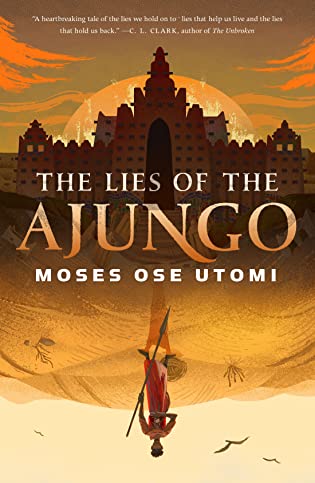 The Lies of the Ajungo (Forever Desert, #1) by
The Lies of the Ajungo (Forever Desert, #1) by 

 Current Giveaways:
Current Giveaways: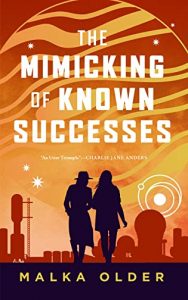 Blog Recap:
Blog Recap: Coming This Week:
Coming This Week:















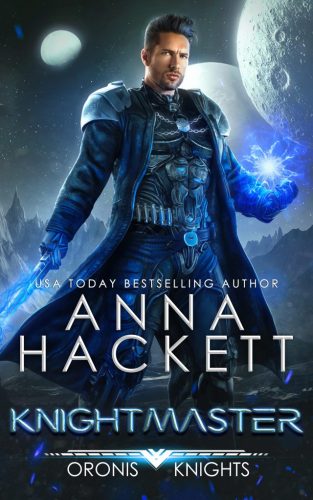 Knightmaster (Oronis Knights #1) by
Knightmaster (Oronis Knights #1) by  We first met the Oronis Knights in
We first met the Oronis Knights in  Escape Rating A-: Their hunt for the knightqueen’s kidnappers lead Kennedy and Knightmaster Ashtin Caydor from scummy space stations with even scummier information brokers to a jungle planet that seems designed to eat them both alive before they can discover the next clue. They’re in a race against time while not knowing their enemy’s true purpose or how much time they have left. If it isn’t already too late.
Escape Rating A-: Their hunt for the knightqueen’s kidnappers lead Kennedy and Knightmaster Ashtin Caydor from scummy space stations with even scummier information brokers to a jungle planet that seems designed to eat them both alive before they can discover the next clue. They’re in a race against time while not knowing their enemy’s true purpose or how much time they have left. If it isn’t already too late.
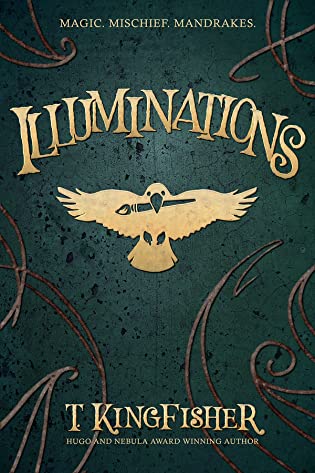 Illuminations by
Illuminations by  Escape Rating B: I picked up Illuminations because I was hoping for another incredibly awesome book like
Escape Rating B: I picked up Illuminations because I was hoping for another incredibly awesome book like  While the recommendations I’ve seen say that if I want more like
While the recommendations I’ve seen say that if I want more like 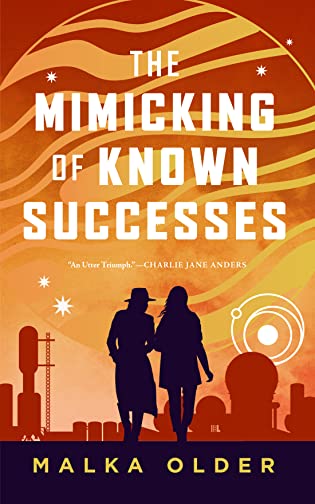 The Mimicking of Known Successes (Investigations of Mossa & Pleiti, #1) by
The Mimicking of Known Successes (Investigations of Mossa & Pleiti, #1) by 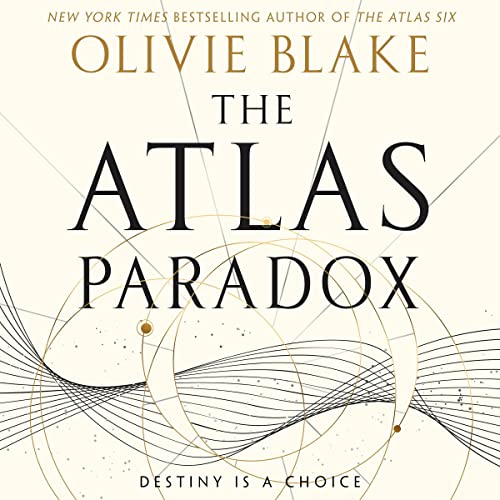 The Atlas Paradox (The Atlas, #2) by
The Atlas Paradox (The Atlas, #2) by  This story of dark academia, utter corruption and potentially the end of the world follows directly after the events of
This story of dark academia, utter corruption and potentially the end of the world follows directly after the events of  The Atlas Six
The Atlas Six
 Current Giveaways:
Current Giveaways: Blog Recap:
Blog Recap: Coming This Week:
Coming This Week: